- Home
- Joy Fielding
See Jane Run Page 14
See Jane Run Read online
Page 14
“How long has he been like this?” Jane asked, not sure for whom she felt more sorry.
“It gets worse every year. He can’t hear, not that he listens. He’s rude, argumentative. I never know what he’s going to say or do next. The other night I woke up about three o’clock—I haven’t been sleeping that well since Daniel left—so I thought I’d check on him. I found him standing in the front hall, staring at the door. When I asked him what he was doing, he said he was waiting for the morning paper, and why wasn’t his breakfast ready? When I told him we didn’t usually eat breakfast in the middle of the night, he said that if I wouldn’t get it for him, he’d make it himself. So what does he do? He puts a bunch of eggs in the microwave and turns it to High. A few minutes later, I hear this explosion. I come running in. The place is a mess. The microwave looks like it’s been hit by a bomb. It’s three A.M. and I’m cleaning eggs off the fucking ceiling. It would be funny if it weren’t so damn pathetic.” She shook her head, the same gesture as her father’s. “Can you believe it? You’re having problems I can’t even imagine, and here I sit bitching about mine!”
“How long has he lived with you?”
“Since my mother died. Six years now, I guess.”
“How did your mother die?”
Carole’s voice was soft, barely audible. “What else?—cancer. It started in her stomach, then it kind of branched out everywhere.”
“I’m sorry.”
“It was hard.” She paused, her eyes filling with tears. “I remember going to visit her in the hospital a few days before she died, and she was in a lot of pain, even with all the drugs. I asked her what she thought about all day, lying there staring up at the ceiling, and she said, ‘I don’t think about anything. I just want it to be over.’”
“I wish I could remember my mother,” Jane said, noting the look of surprise that overtook the sadness in Carole’s face. “Michael told me about the accident.”
“He did?”
“Not a lot. Just that she died instantly, and that it happened about a year ago.”
“A year ago, already,” Carole muttered. “God, time goes so fast. You have no memories of her at all?”
Jane shook her head. “I look at pictures of her, and they mean nothing to me. I feel so … disloyal.”
“I know all about feeling disloyal.” Carole pulled her chair so close to Jane’s that their knees were touching. She leaned forward, whispering conspiratorially. “I love my father. But sometimes, lately, it’s like I’m just putting in time, waiting for him to die. Oh God, I’m so awful. You don’t even know me, and you must think I’m the most awful person alive.”
“I don’t think you’re awful. I think you’re human.”
Carole’s face broke into a grateful smile. “That’s why I was always on your doorstep after Daniel left. You always managed to find something to say that would cheer me up.”
“Tell me about Daniel. That is, if you don’t mind talking about him.”
“Are you kidding? I live to talk about Daniel! I have no friends anymore because they got so bored with listening to me go on and on about Daniel. They think I should stop talking and get on with my life, but I’m still not ready to give up the ghost. Not after fifteen years together. There’s still too much I want to say.”
“Say it to me. Please,” Jane urged. “Maybe if people would start treating me the way they always did,” she continued, putting her thoughts of the past few days into words for the first time, “then I’d get the hang of my life that much quicker. Right now, everybody’s so busy being solicitous, tiptoeing around me, doing things for me, and making sure I get my rest, that I feel like I’m living in some kind of glass bubble. Please,” she said again, “tell me about Daniel.”
“Well, just don’t say I didn’t warn you.” Carole waited for Jane’s nod of assurance. “We got married when I was twenty-eight. I was really ready to get married, let me tell you. Here I was, a little overweight, not the prettiest girl on the block, all my friends were already married. I was getting desperate. My parents had all but given up hope. You’re about ten years younger than I am, so you probably can’t relate to that kind of desperation, but this was just before it became fashionable to say you could get along without a man. So here comes Daniel Bishop. He’s a dentist. He’s good-looking. He’s a few years younger than I am, but so what? It was only five years. I fell head over heels.”
“So, you got married,” Jane prompted.
“Actually, I got pregnant first. Then we got married. We had Celine, and then a few years later, we had Andrew. It was a strain at first, but the marriage seemed to be getting better as the years went on. Daniel’s practice was flourishing. Everyone was healthy. The money was rolling in.
“And then things started to go wrong. Daniel discovered one of his partners was robbing him blind, and that was a whole mess, they had to go to court. And then my mother got sick, and that put a real strain on things. And then, of course, my father came to live with us after she died. I think it all got to be too much for Daniel. I tried to get him to talk about it, but he was never much of a talker. He liked to get rid of his tensions athletically, which kind of left me out in the cold, since I’ve never been very good at sports. He took up running, and he became a fanatic about it. He had to run every day. At first, he tried to get me to run with him, but I kept telling him I was too old, I’d leave the running to the young guys. Mistake, right?
“Then he had this good offer to go into practice with some guy he’d gone to school with, and he wanted to take it. It meant moving to the Boston area, but we both thought it would be a new beginning for us. At least that’s what we tried to tell ourselves.
“We bought this house; we bought a dog. The kids started school. Everybody seemed happy. Daniel loved his new partners, adored his practice. He joined a tennis club and a golf club, and he started running again every day. Sometimes he’d take the dog, which is how he met you.”
“Tell me,” Jane said eagerly.
“Well, the way I remember it is that he came home after work one day and decided that J.R. needed some exercise. J.R. after that fellow on Dallas, right? And so he took the dog out with him one morning. Just before they really got going, J.R. heard the call of nature, and decided to answer it. And of course, Daniel hadn’t bargained on that and didn’t have his pooper scooper with him, so he was just standing there, jogging in place, while the dog did his business on your lawn. Suddenly, he heard a scream. Actually, the whole neighborhood heard a scream.”
“Me?” Jane asked, already intuiting the answer.
“‘Get that shit off my lawn!’ you yelled. Oh, it was glorious. ‘Hey, you, get that shit off my lawn!’ And you came flying out your front door, waving your arms. Daniel said later he thought you were going to hit him.”
“Oh, no.”
“Oh, yes. You were beautiful. So angry. So indignant. ‘I have a little girl who plays on this lawn,’ you shouted at him in no uncertain terms. I was standing at the front door, and I thought, ‘Oh, great, she’ll never make me one of those fabulous chocolate cakes again.’ So Daniel dutifully returned to the house and got a plastic bag and went back to your lawn and picked the poop up. And next thing I knew, the two of you were fast friends and running together whenever you could work it into your schedules.”
“It seems I have quite a temper.”
Carole’s face grew grave. “Yes, I’d say you do.”
“When did Daniel move out?”
“October twenty-third. There was no big fight, no major disagreement, nothing you could point to directly and say, ‘This is what led to that.’ He’d just had enough, I guess. He was tired of my father, tired of having two teenagers, and tired of me. He decided he was still young enough to play the swinging bachelor. So, he bought himself a condominium on the waterfront in downtown Boston, paid over a million dollars for it, and now he jogs along the Freedom Trail every morning instead of the less exciting streets of Newton Highlands, and he walks to
work, and he gets to see the kids whenever he feels like it, and his life is just the way he wants it. Isn’t that peachy?”
“Just peachy.” Jane thought of the lipstick she had purchased, then neglected. She decided to put some on when she got home.
“How do they work it?” Carole demanded, getting to her feet and walking over to the counter, where she poured herself another cup of coffee and helped herself to some oatmeal and raisin cookies from a chipped ceramic cookie jar. “You want some?”
Jane shook her head.
“I mean, how do they manage to stay little boys all their lives? How come they get to throw away a lifetime of responsibilities and date blondes, and we get to sit here and watch our pubic hair turn gray? I mean, I ask you, is it fair?” She finished one cookie, then started another. “What would you know of any of this? You’re married to the perfect man.”
“He does seem very nice,” Jane agreed, feeling like an idiot. Could she really be describing her husband of eleven years in this way? He does seem very nice?
She turned to Carole and found the other woman staring at her, as if there was something she wanted to say, something she wanted to tell her. “What?” she asked.
Carole was startled into a flurry of useless activity. She returned to the table and sat down, lifted her coffee to her mouth, then deposited the mug back on the table without taking a sip, then repeated the same action with her cookie. “What?” she said, parroting Jane. “What do you mean?”
“You looked like you had something you wanted to tell me.”
Carole shook her head. “No. Nothing.”
“Please, tell me. Was it something about Michael? Something about our relationship?”
Carole brought the coffee to her lips and, this time, took a long sip. “I think if you have any questions about your relationship with Michael, he’s the one you should ask. Really, I don’t know anything.”
“Would you tell me if you did?”
There was a long pause as Jane watched Carole trying to measure out her response. The radio was playing k.d. lang in a duet with Roy Orbison. “Isn’t Roy Orbison dead?” Carole asked suddenly.
“I think so,” Jane told her, feeling suddenly out of sync with the conversation. “Didn’t he die a few years back?”
“I can’t remember. See? That’s what I mean about getting older and forgetting everything. I always used to know who was dead.”
From outside in the backyard came the sound of loud barking.
“Oh, shut up, J.R.,” Carole barked in return through the closed window. The dog went immediately silent. “I wish everybody was that easy to control,” she sighed. “Hey, I’ve got a joke for you.”
Jane waited, understanding that their real conversation was over.
“This woman finds a magic lamp, and she rubs it, and out pops a genie. And the genie tells her that he’ll grant her any wish her heart desires. So she thinks for a minute and then she says, ‘I wish for thin thighs!’ And the genie looks at her and says, ‘That’s it? That’s your wish? I tell you I’ll grant you anything your heart desires, and you wish for thin thighs! There are people out there starving; wars are raging, disease and poverty are everywhere. And you, who could wish for anything, you wish for thin thighs!’ And of course, this poor woman is very embarrassed, so she thinks for a minute, and then she says, ‘Oh, all right. Thin thighs for everyone!’” Carole burst into great gales of laughter. Jane managed a few chuckles. “Oh, what would you know?” Carole asked. “Your thighs are like match-sticks. My father was right. You’re too thin. Have a cookie.”
Jane was about to accept when she heard a frantic knocking at the front door.
“Carole,” her father shouted from upstairs, “someone’s at the door.”
Carole was already on her feet. “It’s either Andrew, who’s forgotten something, or Celine, who’s so loaded down with parcels that she can’t find her keys.”
Jane knew even before Carole reached the front door that it was neither Andrew nor Celine. “Is Jane here?” she heard Paula ask, her voice just shy of hysteria.
“Yes, she is,” Carole said calmly. “We were just having some coffee. Would you like a cup?”
“I’ve been frantic,” Paula said, rushing into the kitchen and confronting Jane. “Why didn’t you tell me you were going out?”
“I didn’t think it was necessary,” Jane lied. “You were busy. I didn’t want to bother you.”
“I went to see if you needed anything, and you weren’t in your room. I searched the whole house, the backyard, the garage. I ran up and down the street twice before I thought of coming here. I was at my wits’ end. I thought you might have run off again.” She was on the verge of tears.
“I’m sorry if I frightened you,” Jane told her, and she was. It had been very irresponsible of her to leave the house without at least telling Paula where she’d be. Why hadn’t she? “I just wanted to get out of the house for a while.”
“Well, I can understand that,” Paula told her, catching Jane by surprise. She hadn’t expected Paula to be sympathetic. “Just that next time, I wish you’d tell me first.”
“Next time I will.”
“And meantime,” Paula said, checking her watch, “we really should get home. You should have a nap before Dr. Whittaker gets back, and—”
“I know,” Jane said. “It’s time for my pills.”
TWELVE
SHE woke up with a headache.
The dull throbbing emanated from the base of her neck and stretched into her skull, like a tree in winter, spindly and bereft of adornment, its bare branches catching on delicate nerve endings. Even her teeth ached.
Just another day in Paradise, she thought, trying to swing her legs out of bed. They felt heavy, as if someone had attached lead weights to them while she slept. She checked. Her bare toes wiggled back at her from beneath her white cotton nightgown. No lead weights that she could see, she thought, standing up and leaning against the bedpost for support. Only the ones in her head.
She sighed, fighting the urge to climb back into bed. What point was there in getting up? She felt lousy. She’d only feel lousier as the day progressed. In a few minutes, Paula would be in to check on her, to feed her more pills, and offer her breakfast. And then she’d sleep some more, and when she wasn’t sleeping, she’d go back over the photograph books trying to remember who all these strange people were, even though Michael had gone over every photograph with her at least half a dozen times until she knew each person’s name by heart, and would undoubtedly recognize each and every one of them should she ever run into any of them on the street, which was unlikely, since she rarely left the house.
She looked toward her bedroom door, expecting to see her jailer’s face, but there was no one. “You’re not being fair,” she said to her reflection in the mirror. “Paula is not your jailer. You are.”
She stared at the stranger in the mirror, watching the woman pull at the front of her white nightgown in disgust. “Whoever you are, you have lousy taste,” the woman told her. “This thing has about as much sex appeal as a straitjacket.” Which would probably be more appropriate attire, she added silently.
So why do you keep putting it on? her eyes demanded of their mirror image.
Because every time I throw it in the hamper, you-know-who washes it and lays it back across my pillow. And it’s easier to wear it than to fight about it. And it’s safe, she realized. She didn’t have to worry about it stirring anything in her husband that she wasn’t yet prepared to deal with. She could probably wear this number in front of Warren Beatty and not get any response.
She ran her hands along her body, her fingers grazing the tips of her breasts, the slight curve of her stomach, the soft mound of her pubis. She felt a gentle stirring. How often did she and Michael make love? she wondered. And what kind of lover was he?
She dropped her hands to her sides. These were not questions she was prepared to deal with. What was the point in activating these impulses if sh
e wasn’t ready to act on them?
Was she ready to act on them? Was she ready to make love to a man she didn’t know just because he was her husband?
“Are you?” she asked the woman in the mirror.
The woman shrugged.
“Slut,” Jane said, and laughed, then spun around, expecting to see Paula’s disapproving face in the doorway.
Then she remembered it was Saturday. Paula had weekends off. It would just be her and Michael. Lots of time to act on these desires should she make that choice. Could that really be what she wanted? Could it be as simple as that?
Maybe her enforced celibacy was the cause of her headaches. Or the reason for her continued depression. Maybe she just wasn’t used to going this long without sex!
And what would be the harm in going to bed with the man? She found him enormously appealing. And he was her husband, after all. She’d been sleeping with him for eleven years. It wasn’t as if they’d just been introduced. It wasn’t as if she’d just met him and agreed to come home with him.
Except that was exactly how it was.
And she didn’t know him any better now than she had a week ago. Oh, she knew about him. She knew the details of his life, of their life together. She knew that he was kind and sensitive and patient, and everything she could have wished for in a husband.
Maybe that was all she had to know.
So what if she didn’t remember him? Was that really necessary? She’d known him for just over a week now. People often hopped into bed together after knowing one another far less time than that. And she liked him. Even in her confused, depressed state, she found him attractive. She understood why she had been drawn to him some eleven years ago. So what would be the harm in inviting him into her bed? Clearly, he was waiting for an invitation, though he had never said a word. They were consenting adults. What’s more, they were legally married consenting adults. Who would they be offending? Maybe if they slept together, it would help her to remember. And even if it didn’t help her to remember, it just might make her feel better. And what would be so wrong about that?

 The Stranger Next Door
The Stranger Next Door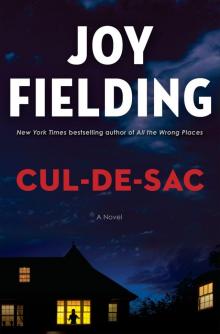 Cul-de-sac
Cul-de-sac The Final Act
The Final Act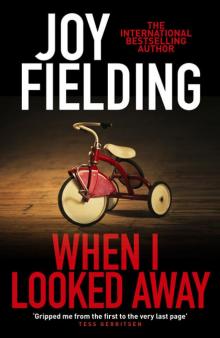 When I Looked Away
When I Looked Away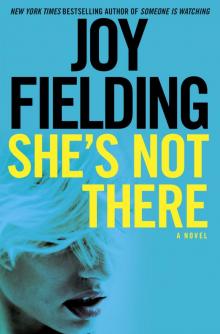 She's Not There
She's Not There All the Wrong Places
All the Wrong Places Now You See Her
Now You See Her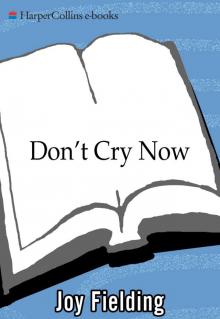 Don't Cry Now
Don't Cry Now Good Intentions
Good Intentions Still Life
Still Life Lost
Lost The First Time
The First Time Whispers and Lies
Whispers and Lies The Other Woman
The Other Woman Charley's Web
Charley's Web Mad River Road
Mad River Road Puppet
Puppet Life Penalty
Life Penalty The Wild Zone
The Wild Zone Home Invasion
Home Invasion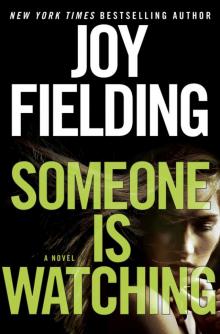 Someone Is Watching
Someone Is Watching Heartstopper
Heartstopper See Jane Run
See Jane Run The Bad Daughter
The Bad Daughter Shadow Creek
Shadow Creek Missing Pieces
Missing Pieces Kiss Mommy Goodbye
Kiss Mommy Goodbye Grand Avenue
Grand Avenue